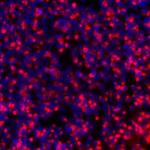
Research Topics
Molecular Control of Growth, Differentiation, and Death in Epithelial Cancer Cells
My laboratory studies signal transduction pathways that regulate growth and programmed cell death in epithelial cancer cells, with a focus on breast and ovarian cancer. We have three projects:
In the first project we are studying the function of Cbl proteins. Human epithelial malignancies frequently display deregulated tyrosine kinase activity. Understanding the mechanisms that regulate signaling by these kinases should uncover new ways to inhibit cancer cell growth. We are investigating the function of Cbl proteins, a family of proteins that regulate tyrosine kinase activity. Cbl proteins belong to the RING finger class of ubiquitin protein ligases (E3s) and function as E3s for activated tyrosine kinases. My group cloned two of the three mammalian Cbl genes (Cbl-b and Cbl-c). We have shown that all mammalian Cbl proteins mediate ubiquitination and degradation of the activated EGFR as well as other components of the signaling complex. Ongoing work is focused on understanding the biochemical and physiologic functions of the three mammalian Cbl proteins in epithelial cells and elucidating the differences in their specificity and/or function.
Cancer cells avoid apoptosis by a variety of genetic and epigenetic mechanisms. In a second project we are investigating the induction of apoptosis by activation of death receptors for the ligand TRAIL in breast and ovarian cancer cells. Our goal is to selectively trigger apoptosis in the cancer cells. We have shown that most breast and ovarian cancer cell lines are resistant to the induction of apoptosis by TRAIL, the ligand for the death receptors DR4 and DR5. We have demonstrated that resistance to TRAIL-induced apoptosis can be overcome by co-incubation of the cells with chemotherapeutic agents, semi-synthetic retinoids (such as 4HPR), or molecularly targeted agents (such as anti-ErbB-2 antibodies). Our current work utilizes biochemical and genetic approaches to identify mechanisms that regulate the induction of death by TRAIL ligand in breast and ovarian cancer cells.
Breast cancer tumors that do not express hormone receptors or have amplification of Her2/Neu (so called triple-negative tumors) have a poor prognosis and no validated molecular targets. In our third project we are using functional genomic approaches and tumor genetics to identify new therapeutic targets in triple-negative breast cancer cells.
Biography
Selected Publications
- Li M, Kales SC, Ma K, Shoemaker BA, Crespo-Barreto J, Cangelosi AL, Lipkowitz S, Panchenko AR. Balancing Protein Stability and Activity in Cancer: A New Approach for Identifying Driver Mutations Affecting CBL Ubiquitin Ligase Activation. Cancer Res. 2016;76(3):561-71.
- Rahman M, Davis SR, Pumphrey JG, Bao J, Nau MM, Meltzer PS, Lipkowitz S. TRAIL induces apoptosis in triple-negative breast cancer cells with a mesenchymal phenotype. Breast Cancer Res Treat. 2009;113(2):217-30.
- Bachmaier K, Krawczyk C, Kozieradzki I, Kong YY, Sasaki T, Oliveira-dos-Santos A, Mariathasan S, Bouchard D, Wakeham A, Itie A, Le J, Ohashi PS, Sarosi I, Nishina H, Lipkowitz S, Penninger JM. Negative regulation of lymphocyte activation and autoimmunity by the molecular adaptor Cbl-b. Nature. 2000;403(6766):211-6.
- Levkowitz G, Waterman H, Ettenberg SA, Katz M, Tsygankov AY, Alroy I, Lavi S, Iwai K, Reiss Y, Ciechanover A, Lipkowitz S, Yarden Y. Ubiquitin ligase activity and tyrosine phosphorylation underlie suppression of growth factor signaling by c-Cbl/Sli-1. Mol Cell. 1999;4(6):1029-40.
- Keane MM, Ettenberg SA, Nau MM, Russell EK, Lipkowitz S. Chemotherapy augments TRAIL-induced apoptosis in breast cell lines. Cancer Res. 1999;59(3):734-41.
Related Scientific Focus Areas
This page was last updated on Thursday, March 6, 2025




